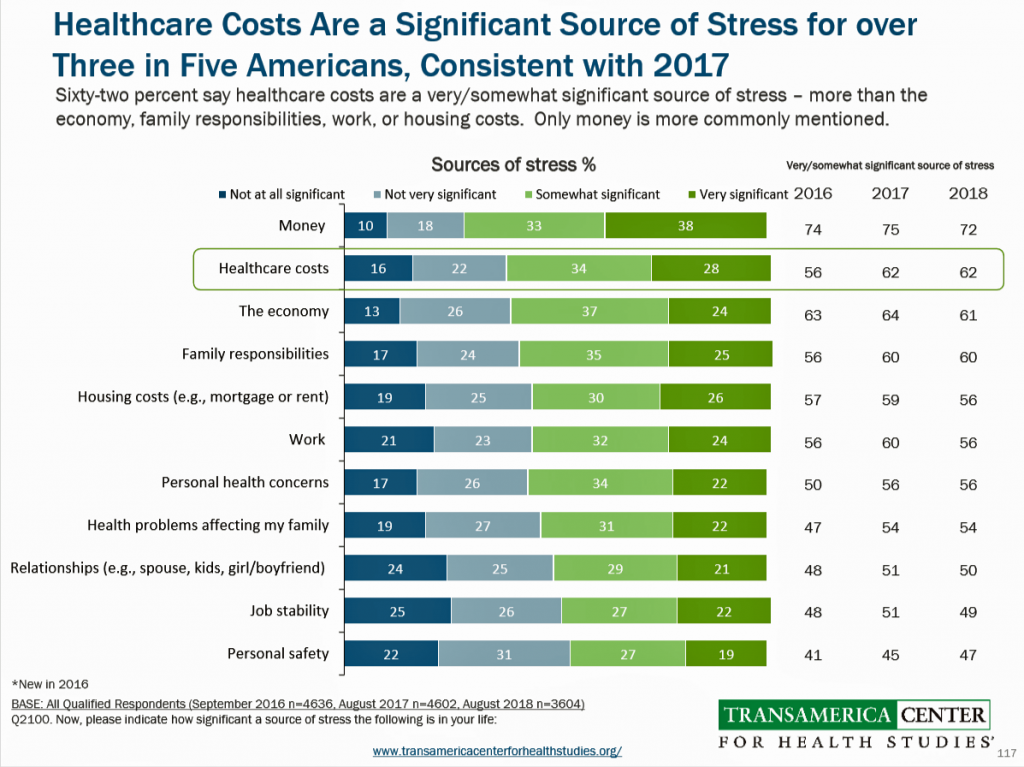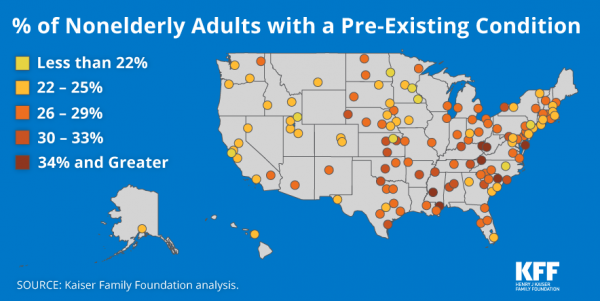With seven days until voters go to the polls for what some call the most momentous U.S. election in decades, most Americans say that healthcare costs are a major stress, second only to money.

So warns the Sixth Annual Nationwide TCHS Consumers Healthcare Survey, with the tagline: “Stressed Out: Americans and Healthcare.”
Perhaps this is why healthcare has become a top voting issue for the 2018 mid-term elections that will be held on November 6 one week from today.
The first chart illustrates that healthcare costs, the economy, and family responsibilities all closely cluster as sources of stress for a majority of Americans in this poll, which was conducted among 3,604 working-age U.S. adults in August 2018.
One-half of people age 18 to 64 have received a surprise medical bill they thought would be covered by insurance, and one-third say that the ability to pay for care they need is the most pressing issue in American healthcare.
Nearly two-thirds of Americans 18-64 have a chronic condition, and 35% of people are worried about losing coverage due to their pre-existing condition if healthcare policy changes.
Thus, most Americans are concerned about potential changes to current healthcare policy, Transamerica found.
 Health Populi’s Hot Points: The vast majority of the most seriously ill patients in the U.S. have health insurance (91%), but even with coverage one-third have serious problems paying hospital bills, and 29% have difficulty affording prescription drugs. This was found in a joint study published by from The Commonwealth Fund, the Harvard T.H. Chan School of Public Health, and the New York Times published earlier this month. It’s titled Being Seriously Ill in America Today.
Health Populi’s Hot Points: The vast majority of the most seriously ill patients in the U.S. have health insurance (91%), but even with coverage one-third have serious problems paying hospital bills, and 29% have difficulty affording prescription drugs. This was found in a joint study published by from The Commonwealth Fund, the Harvard T.H. Chan School of Public Health, and the New York Times published earlier this month. It’s titled Being Seriously Ill in America Today.
Among seriously ill Americans, one-fourth were denied some type of treatment they needed because of the type of insurance they had, or because they didn’t have coverage at all.
Among the seriously ill population that is working age (18-64 years of age), 42% have used up all or most of their savings, 40% were contacted by a collection agency, and 29% cannot pay for basic necessities such as food, heat, or housing.
The second graphic quotes patients’ comments to the survey; let’s focus on the statement with the bold words, “too darn expensive.” The quote reads, in full, “I was diagnosed with asthma-exacerbated pneumonia, and I came very close to dying. And the reason why I got that bad was because I stopped taking my asthma medication, because it was too darn expensive.”
In this patient’s case, she/he could not afford to pay for their prescribed medicine due to cost, and so their illness got worse — resulting in their having to be readmitted to hospital, and costing the U.S. healthcare system even more due to complications.
 We know from recent polling that most Americans across political party identification believe that people with pre-existing conditions should be ensure access to health insurance, and not be charged more for that coverage. This comment could have come from a Democrat, an Independent, or a Republican. Healthcare costs do not discriminate this way; however, the sicker in America tend to use up their financial resources, even when people are covered by health insurance, due to the prices of medicines and medical supplies, and out-of-pocket costs that the sicker and frailer health citizens bear in the U.S.
We know from recent polling that most Americans across political party identification believe that people with pre-existing conditions should be ensure access to health insurance, and not be charged more for that coverage. This comment could have come from a Democrat, an Independent, or a Republican. Healthcare costs do not discriminate this way; however, the sicker in America tend to use up their financial resources, even when people are covered by health insurance, due to the prices of medicines and medical supplies, and out-of-pocket costs that the sicker and frailer health citizens bear in the U.S.
As we approach November 6, American voters in 2018 appear to be very health-cost-pragmatic.





 Interviewed live on BNN Bloomberg (Canada) on the market for GLP-1 drugs for weight loss and their impact on both the health care system and consumer goods and services -- notably, food, nutrition, retail health, gyms, and other sectors.
Interviewed live on BNN Bloomberg (Canada) on the market for GLP-1 drugs for weight loss and their impact on both the health care system and consumer goods and services -- notably, food, nutrition, retail health, gyms, and other sectors. Thank you, Feedspot, for
Thank you, Feedspot, for  As you may know, I have been splitting work- and living-time between the U.S. and the E.U., most recently living in and working from Brussels. In the month of September 2024, I'll be splitting time between London and other parts of the U.K., and Italy where I'll be working with clients on consumer health, self-care and home care focused on food-as-medicine, digital health, business and scenario planning for the future...
As you may know, I have been splitting work- and living-time between the U.S. and the E.U., most recently living in and working from Brussels. In the month of September 2024, I'll be splitting time between London and other parts of the U.K., and Italy where I'll be working with clients on consumer health, self-care and home care focused on food-as-medicine, digital health, business and scenario planning for the future...